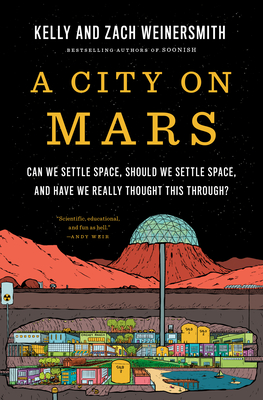Book Review: A City on Mars - Can We Settle Space, Should We Settle Space, and Have We Really Thought This Through?
Settling in outer space has become an ambitious aspiration
for humans of the modern day. Many decades before we were only dreaming of even
setting foot on the moon before that soon became a reality. If humanity has the will and determination to
see through their spacefaring desires, why not reach even further into the
stars and consider making a new home among them? Well, actually there’s a fair
bit of reasoning to consider why it may not be the best idea, at least
currently that is. The idea of space colonization while intriguing is layered
in a lot of logistical barriers we really need to work on before we dive into
our rockets and set course for Mars.
Those barriers serve as the primary focus of Kelly and Zach
Weinersmith’s new book titled a City on Mars, which works to tackle the many
key questions that need to be looked at if we are ever to truly settle and
successfully colonize on other planets.
Kelly and Zach Weinersmith are a married couple who worked
together to construct this book. Zach is
a well-regarded cartoonist with credits in online webcomics and other
collaborative publications. Kelly is
scientist with noteworthy experience in parasitology and biology. The loving
duo notes in the very start of the book about their own hope for a future in
which spreading out across the galaxy.
They went into writing this book with the hope of outlining the
compelling journey that may lead us there but during their research, they came
to note there was more scientific data proving it wasn’t as easy as what people
like Elon Musk or Jeff Bezos might have you believe (Don’t know why anyone
should care about those two to be honest, but I digress). By the time they
were ready to sit down and write this book, it became quite clear to them they
needed to be upfront about what their research was telling them, and that was
that there may be a lot more reason to stay put on Earth for the time being.
That leads us into the majority of this book in which they
breakdown a lot of core arguments which the scientific world uses to justify
space colonization and their own perspectives on the logistical issues that may
pose a serious challenge to them. This isn’t an overly negative book and I
think Kelly and Zach knew they were at risk of coming off as pessimistic so the
balance of open perspective they show here is really appreciated. This book isn’t set up to shut down the idea
of space travel, but more to so give readers a more accurate perspective on the
realities behind it. Space travel is a
wonderful idea, but this isn’t something we can just will into existence. The
realities of biological limitations, corporate influence, geopolitical risks
and space’s general harshness need to be addressed and discussed, this isn’t a
mess we can just cram into the cupboard and hide away. I found the scientific
definition behind their arguments really interesting too, they clearly went to
a lot of effort to cite and backup a lot of their points and it gives the book
a lot more weight in my opinion.
While I found the definition and core objective of the book
compelling, I won’t lie that some aspects of it failed to capture my interest
nearly as much as others. I found when
the book tackled the science of its concepts, it was really interesting to
follow along and learn about. The book
does eventually move into geopolitical area of law and regional governances and
that part really took me out of the experience in all honesty. I appreciate this stuff is relevant to the
overall point of the book but its get’s really tedious learning about different
treaties and acts and how all relate to the prospect of space
colonization. It isn’t presented in
nearly as compelling a format as the books other components and it made working
through these sections notoriously challenging.
I do recommend this book for any intrepid spacefarer who wants to learn the journey we may have to take if we are ever to truly settle into outer space. It may come off as a pessimistic book to some but I can see this is intended to be a more transparent accounting of the issues we must resolve. Modern science is prone to being dismissed in favour of progress, but when you’re on a planet a million miles away from Earth you need to be fully equipped to handle the potential issues that might generate and this book does an excellent job of highlighting these points.



Comments
Post a Comment